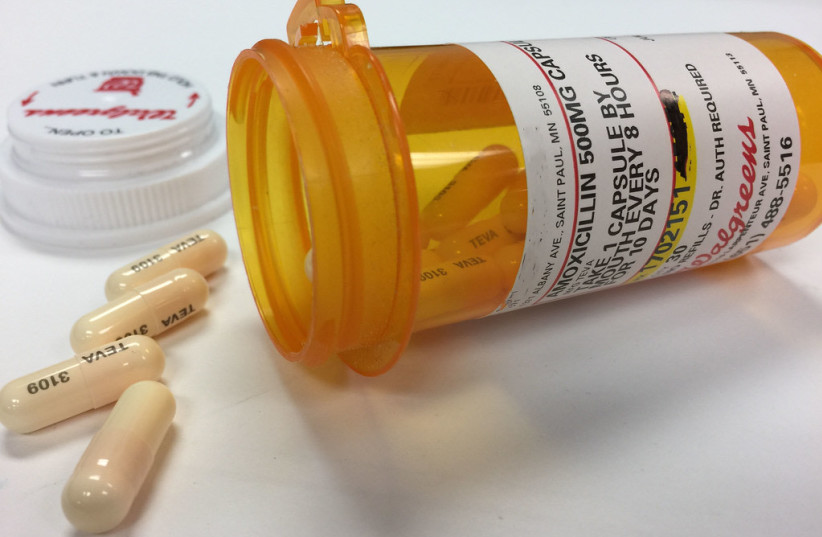Many years of wars in Iraq have resulted in a serious rise in bacterial resistance to antibiotics, with implications for the entire region and the world, warn experts. Destroyed healthcare infrastructure, medicine shortages, limited resources, heavy metal contamination and poor sanitation likely to blame, according to medical experts in Lebanon.
Dr. Antoine Abou Fayad of the department of experimental pathology, immunology and microbiology at the American University of Beirut and colleagues have just published a study in the journal BMJ Global Health under the title “Antimicrobial resistance and the Iraq wars: armed conflict as an under-investigated pathway with growing significance.”
Decades of wars and conflict in Iraq have led to a “catastrophic” rise in antibiotic resistance in the country, with serious implications for the entire region and the world, warn international experts in the open BMJ Global Health.
They warned that the combination of destroyed healthcare infrastructure, shortages of medications, limited resources, high levels of heavy metal contamination, and poor sanitation is likely to blame. Antimicrobial resistance (AMR) is rising globally at an alarming rate and is expected to cause 10 million deaths a year by 2050 if nothing is done about it, the authors wrote.
Overuse and misuse of antibiotics

Until now largely attributed to the overuse and misuse of antibiotics, attention is now turning to other factors such as heavy metals and disinfectants containing quaternary ammonium compounds (QACs), which are widely used in the healthcare and hospitality sectors.
War has been implicated in the emergence of AMR as far back as the 1940s, but has received little attention, they continued. “Iraq is a stellar example of this neglect, as the country has experienced a sequence of conflicts since the 1980s that have coincided with the emergence and spread of pathogens with specific patterns of antibiotic resistance, they highlight.”
These conflicts include the Iran-Iraq war (1980–88); the First Gulf War in 1991; UN economic sanctions following the Iraqi invasion of Kuwait (1990- 2003); the US invasion and occupation (2003–11) including a period of militarized violence (2005-07); and Iraqi state conflicts with ISIS (Islamic State of Iraq and Syria) in 2014–17.
Many healthcare workers fled from Iraq since 2003, with many reporting violent attacks on health facilities or personnel as a primary driver. “With a lack of a well-established antimicrobial stewardship system, especially compromised by the conditions of war faced by the country’s healthcare system, the administration of broad-spectrum antibiotics as empirical therapy for war wounds was widespread, leading to selection for highly resistant organisms. Moreover, the administration of even broader-spectrum drugs for the treatment of multidrug-resistant (MDR) infections further contributed to AMR by increasing the potential for nosocomial [in-hospital] transmission.”
Protracted conflict in Iraq, they continued, “has had adverse implications to population health. And yet, it is worth noting that Iraqi institutions have rarely been the source of information on AMR in Iraq across these conflict periods. Rather, what we know about AMR in Iraq is largely sourced from US military medicine during the period of the US invasion and occupation and from humanitarian organizations operating in Iraq throughout the conflict period. One of the legacies of British rule in Iraq was the establishment of an expansive healthcare system that attracted patients region-wide for medical treatment in Iraq. Armed conflicts since the 1990s have accompanied a progressive deterioration of Iraq’s national healthcare system, leading to lack or limitation in trained staff, infection prevention and control, access to many classes of antibiotics and proper clinical microbiology for guiding clinicians," Fayad and colleagues wrote.
“Contemporary conflicts, waged in urban and industrialized landscapes pressure microbes with selective environments that contain unique combinations and concentrations of toxic heavy metals and antibiotics, while simultaneously providing niches and dissemination routes for microbial pathogens,” the authors stressed.
“These can include the high number of wounded, the nature of wounds, refugee displacement, collapse of sanitation controls, loss of diagnostics and skilled healthcare personnel, the dismantlement of healthcare infrastructures and the placement of often under-resourced and improvised field hospitals where both injured combatants and civilians are exposed to harmful pathogens with limited care and resources to properly recover.” Such outcomes have occurred in Iraq.
Heavy metals from weapons
Heavy metals used in weapons persist in the environment, with explosives containing huge amounts of lead and mercury. Chromium, copper, lead nickel and zinc are used to coat bullets, missiles, gun barrels and military vehicles, while antimony, barium, and boron are weapon-priming compounds – and many bacterial species have been shown to have evolved resistance to combat heavy metals’ toxicity, they continued.
“Taken together, a destroyed healthcare infrastructure, inappropriate microbial therapies, limited resources, high heavy metal contamination in humans and the environment and lack of proper water, sanitation and hygiene combined, likely play instrumental roles in the catastrophic rise of AMR in Iraq and, by extension, regionally and globally,” the authors wrote.
Research is urgently needed to understand the direct and indirect roles of armed conflict on the rise of AMR if it is to be stopped and millions of needless deaths prevented. “Understanding these linkages between AMR and conflict, especially across time, is essential for a global response to AMR, especially as there is little indication that conflict, worldwide, will abate in years to come.”
